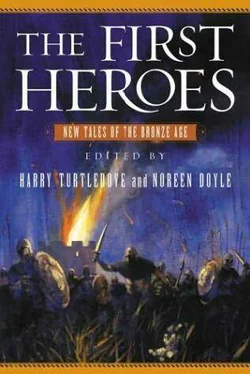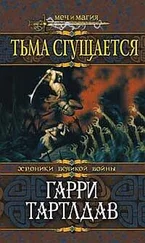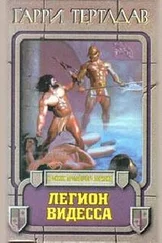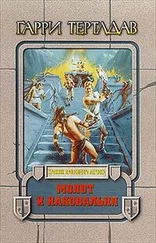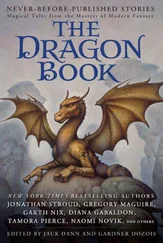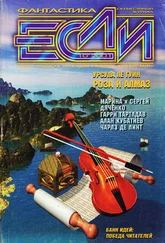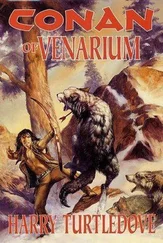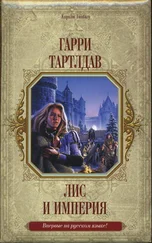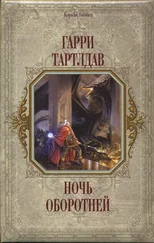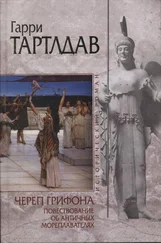Гарри Тертлдав - The First Heroes
Здесь есть возможность читать онлайн «Гарри Тертлдав - The First Heroes» весь текст электронной книги совершенно бесплатно (целиком полную версию без сокращений). В некоторых случаях можно слушать аудио, скачать через торрент в формате fb2 и присутствует краткое содержание. Жанр: Фантастика и фэнтези, на английском языке. Описание произведения, (предисловие) а так же отзывы посетителей доступны на портале библиотеки ЛибКат.
- Название:The First Heroes
- Автор:
- Жанр:
- Год:неизвестен
- ISBN:нет данных
- Рейтинг книги:3 / 5. Голосов: 1
-
Избранное:Добавить в избранное
- Отзывы:
-
Ваша оценка:
- 60
- 1
- 2
- 3
- 4
- 5
The First Heroes: краткое содержание, описание и аннотация
Предлагаем к чтению аннотацию, описание, краткое содержание или предисловие (зависит от того, что написал сам автор книги «The First Heroes»). Если вы не нашли необходимую информацию о книге — напишите в комментариях, мы постараемся отыскать её.
The First Heroes — читать онлайн бесплатно полную книгу (весь текст) целиком
Ниже представлен текст книги, разбитый по страницам. Система сохранения места последней прочитанной страницы, позволяет с удобством читать онлайн бесплатно книгу «The First Heroes», без необходимости каждый раз заново искать на чём Вы остановились. Поставьте закладку, и сможете в любой момент перейти на страницу, на которой закончили чтение.
Интервал:
Закладка:
The king could hardly contain himself. He must have prayed for this; his gods had given him all that he asked for. But the roots of his avarice were sunk deep. "Bring me a dowry," he said, "of the riches of Uruk. Every year a caravan of wheat and barley, with all the beasts that bear it, and a tribute of gold, and a mantle woven by the king's own women, a royal garment worked with images of the alliance between Aratta and Uruk."
Her lips were tight, her nostrils white, but she said steadily, "In return for the god of chariots, his art and craft, his chariot and his horses, and teams of onagers with their drivers and those who tend them, I will bring you such a dowry."
Lugalbanda watched the king reflect on the bargain, and ponder the riches that were laid in his hand—and what else might he win in this moment of her weakness?
He was a slave to his greed, but he was not a fool. He could see as well as any other man how far he had driven the goddess. He chose to desist while he held the advantage. "Done," he said, "and sworn before all who have witnessed it."
"Done and sworn," she said, still with that perfect, level calm.
"Lady," Lugalbanda pleaded. "Oh, lady. Nothing is worth such a sacrifice." Inanna looked down at him where he knelt at her feet. She knew how he yearned after her; she would have had to be blind not to know it. But it was a clean yearning, the worship of a pure heart.
She raised him, though he resisted her, and laid her hands on his shoulders. "Uruk is worth any price."
"Uruk could find another way," he said. "You'll wither and die here, bound to that man."
"I hope I am stronger than that," she said.
She kept the quaver out of her voice, but he loved her well enough to see through her mask of courage. "Lady," he said, and he wept as he said it. "Lady, you don't have to do this."
"You know I do," she said. "Go now, prepare the caravan. The sooner you're out of this place with the god and his chariots, the better for us all."
But he was not her dog, to run tamely at her bidding. "I'm not going until the bargain is signed and sealed."
"If you wait," she said, "you may not be allowed to leave at all."
He did not like that, but he gave way to her wisdom. He must see what she saw: that the king of Aratta was not an honest merchant. She prayed that it was not already too late. "Go," she said. "Be quick. Time is short." He hated to leave her. She hated to see him go. But her choice was made, and his must not be made for him—to remain a prisoner in Aratta, with the god of chariots bound beside him.
The gates of Aratta were closed, and the guards were politely immovable. "After the wedding feast," they said, "you may go and welcome. The king requires the men of Uruk to witness the conclusion of the bargain, so that there may be no question in their city that it was truly fulfilled."
There was no arguing with that, or with arrows aimed at their throats and spears turned toward their hearts. The guards' courtesy was as honest as it could be, but so was their determination to carry out their king's orders.
"Do you solemnly swear," Lugalbanda asked their captain, "that when the wedding is over, when the price is fully paid, we will be allowed to go?"
"I do swear," the captain said.
Lugalbanda had to accept the oath. It was no more than his own heart had desired before the goddess commanded him otherwise.
The walls were closing in. This must be how it had been for the god of chariots, bound in forest and constrained by mountains. Had he felt the narrowness of Aratta's walls, and the will of its king crushing his own beneath it? Inanna could not go to him to ask. She was shut within the women's house, surrounded by an army of servants. In a day and a night, in a fever of activity, they had made a royal wedding.
She had giv en herself up to them and let them make her beautiful, clothing her in the richest of the fabrics that had come from Uruk and adorning her with gems and gold. She fixed her mind on that and not on the man she had taken for Uruk's sake. She must not grieve; she must know no regret. This choice was made as it must be. She had been born into this world for such choices.
Even as strong as she endeavored to be, when the king's maids led her out to her wedding, it was all she could do to keep her head high and her shoulders straight. If she could have turned and run, she would have done it.
The king was waiting in his hall, naked but for the skin of a forest lion. She in linen and fine white wool, with her hair elaborately plaited and her face bravely painted, felt herself diminished by the raw power of this mortal beast.
She was a goddess, a daughter of heaven. She must not falter, even at the sight of Lugalbanda among the king's men with the rest of the guards from Uruk. She must not think of what it meant that Lugalbanda had disobeyed her command, or that the men about him had the look of men guarding a captive—or most disturbing of all, that the god of chariots was nowhere to be seen.
The chief of Aratta's priests set her hand in the king's and spoke the words that made her his wife. Her heart was small and cold and remote. She felt nothing, not even fear.
The king had joy enough for both of them. He took her as if she had been a great gift—and so she was, the greatest that had ever been given in this city. He neither noticed nor cared that she was silent. His delight was entirely his own.
The wedding feast was long and boisterous, but all too soon it ended. The women led Inanna away while the men were still carousing over date wine and barley beer. They had prepared the bridal chamber, hung it with fragrant boughs and adorned it with hangings of richly woven wool. The bed was heaped high with furs and soft coverlets, and scented with unguents from the south. They took away her wedding garments but left the ornaments, and set her in the midst of the bed. They shook her hair out of all its plaits and combed the shining waves of it. Then they anointed her with sweet oils and bowed low before her and left her there, alone, to wait for the coming of the king.
She had hoped as a coward might, that he would lose himself in the pleasures of food and drink and lively company. But he had not forgotten why he celebrated the feast. He came as soon as he reasonably could. The sun had barely left the sky; it was still light beyond the walls. The king's men would carry on until dawn, but he had come to take what he had bargained for.
He was clean—that much she could grant him. He took no care for her pleasure, but neither did he cause her pain. He seemed not to notice that she lay still, unresponsive, while he kissed and fondled her. It was enough for him to possess her.
He was easily pleased. When he had had his fill of her, he dropped like a stone.
She eased herself away from his sleeping bulk. Her body was as cold as her heart. She wrapped it in one of the coverlets and crouched in the far corner of the bed, knees drawn up, and waited for the dawn.
With the coming of the day, Lugalbanda found the gates open and the way clear, as the captain of guards had promised. The caravan was drawn up, and his men were waiting. But the god of chariots was nowhere to be seen.
Lugalbanda was not in the least surprised. He called on the men he trusted most, who were his friends and kinsmen—five of them, armed with bronze. With them at his back, he went hunting the god.
The temple was empty, the forge untended. Its fires were cold. The god was gone. None of the king's servants would answer when Lugalbanda pressed them, and the king himself was indisposed. Still it was abundantly clear that the king of Aratta had not honored his bargain.
The god could have gone rather far, if he had been taken before the wedding feast. The gates were still open, the guards having had no orders to shut them. Lugalbanda stood torn. Go or stay? Take what he could and escape while he could, or defend the goddess against the man to whom she had bound herself?
Читать дальшеИнтервал:
Закладка:
Похожие книги на «The First Heroes»
Представляем Вашему вниманию похожие книги на «The First Heroes» списком для выбора. Мы отобрали схожую по названию и смыслу литературу в надежде предоставить читателям больше вариантов отыскать новые, интересные, ещё непрочитанные произведения.
Обсуждение, отзывы о книге «The First Heroes» и просто собственные мнения читателей. Оставьте ваши комментарии, напишите, что Вы думаете о произведении, его смысле или главных героях. Укажите что конкретно понравилось, а что нет, и почему Вы так считаете.
